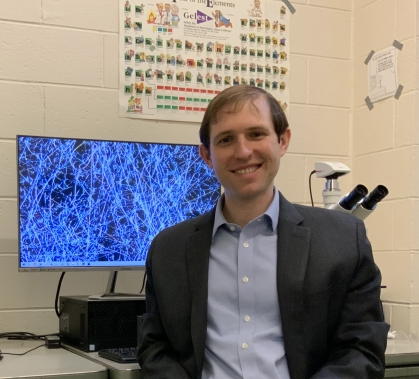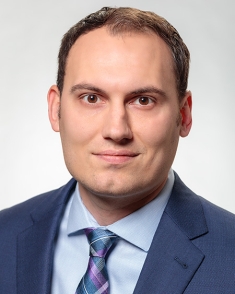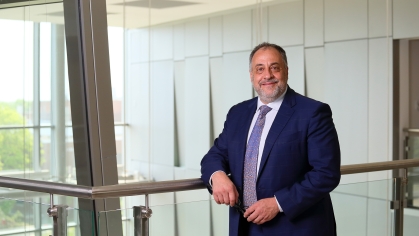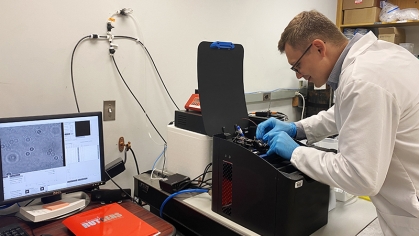MAE Professors Receive DARPA Young Faculty Awards
School of Engineering faculty members Jonathan P. Singer and Steven Berg are the recipients of the highly competitive two-year Defense Advanced Research Projects Agency, or DARPA, Young Faculty Award (YFA).
Each year, approximately 30 junior faculty grantees nationwide are introduced to Department of Defense requirements through YFA funding and mentoring to spur research related to national security needs.
Berg and Singer, who are both members of the Department of Mechanical and Aerospace Engineering, have each been awarded a two-year $500,000 grant with the option to submit for an additional $500,000, one-year prestigious Director’s Fellowship award.
On the Cutting-Edge of High-Risk, High-Reward Research

Associate Professor and Mary W. Raisler Distinguished Teaching Chair Jonathan Singer’s project “Formable Ordered Microcomposite Energetics (FOMEs)” focuses on developing composite materials to help tune the mechanical and reactive properties of solid rocket propellant. According to Singer, such advanced structural propellants will “enable enhanced rocket dynamics and efficiently deliver complex payloads into orbit aboard future spacecraft,” supporting both military space missions and the burgeoning commercial space economy expected to reach $1 trillion by 2030.
“This project,” Singer explains, “builds on an established but growing relationship between Rutgers and our Army neighbors at Picatinny Arsenal. Being able to participate in a DARPA project, which by design is high-risk, high-reward research together with Picatinny, a Center of Excellence, means that this project lives in the blue sky of cutting-edge research while being firmly rooted in the ground of challenges of immediate relevance – greatly increasing the chances of transition.”
For Singer, the DARPA award is a great honor, “awarding both accomplishment and potential. DARPA’s focus on emerging technologies makes this an inspiring opportunity to explore something new. That I am getting to work with experienced guides in this journey allows me to come into this without the apprehension it might otherwise entail.”
Exploring the “No Man’s Land” Between Spaceflight and Atmospheric Flight

Assistant Professor Steven Berg’s project, “Data Driven Engineering for VLEO Spacecraft Aerodynamic Performance Enhancement,” seeks a way to enable sustained flight at VLEO – very low Earth orbit – which he describes as a “no man’s land” between spaceflight and atmospheric flight.
Berg states, “I can’t understate my excitement for this project, which is a great opportunity to capture a foothold in this nascent area of aerospace, and could be the foundation of my research career moving forward.”
“This project ventures into that unknown, which to me is part of the spirit of aerospace research, both past and present. By enabling a better view of Earth, with the same coverage of a satellite, it would revolutionize national security, weather prediction, climate science, and business, all of which rely on Earth observation data to function effectively,” Berg explains.
After building a wind tunnel that creates the airflow conditions of the VLEO regime and measuring the interactions of the flow on different surfaces, Berg will use the collected data to “create a model using machine learning and AI to predict the aerodynamic performance of a given surface. “This,” Berg predicts, “will help enable discovery of new materials that are better suited for the VLEO flight regime.”
On the Right Trajectory
Singer notes that “DARPA is about disruption, and winning a YFA means that you are bringing a disruptive idea to the table. That the Department of Mechanical and Aerospace Engineering was able to do this in two highly distinct topics shows how the department has diversified its research capabilities over the past decade under the guidance of SoE’s dean Alberto Cuitiño and MAE department chair Assimina Pelegri.”
Berg adds, “The fact that our department received two awards in one year is indicative of the excellence of the department, and also the fact that it is an award for young faculty – pre-tenure or three years post-tenure – really speaks to the upward trajectory that we plan to sustain.”
These studies were funded by the Young Faculty Award program of the Defense Advanced Research Projects Agency (DARPA) under the grants D24AP00314-00 (Singer) and These study were funded by the Young Faculty Award program of the Defense Advanced Research Projects Agency (DARPA) under the grants D24AP00314-00 (Singer) and D24AP00316-00 (Berg). The views, opinions, and/or findings expressed are those of the authors and should not be interpreted as representing the official views or policies of the Department of Defense or the U.S. Government.


